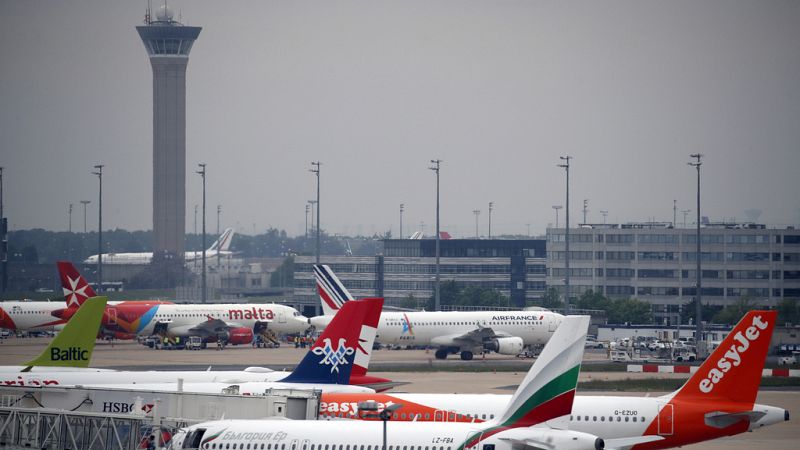Hungary slammed for 'absurd' proposal to delay aviation fuel levy until 2049

A leaked document suggests Budapest wants to abandon the idea of setting a minimum levy on the kerosene that powers the booming airline industry before mid-century, in an apparent bid to unblock a stalled reform of European energy taxation rules that has sparked outrage among environmentalists.
The European Commission proposed three years ago a reform to the 2003 Energy Taxation Directive as part of a package of measures to achieve the new target of a 55% cut in CO2 emissions by 2030, including a proposal to scrap the blanket exemption for aviation and maritime fuels.
But the bill has been subject to repeated delay, exacerbated by the fact that tax is one of a handful of policy areas where EU legislation can only be enacted if backed unanimously by all 27 member states.
In a compromise proposal seen by Euronews that looks to break a deadlock in intergovernmental talks, current EU Council presidency holder Hungary has suggested minimum tax rates for aviation and maritime fuels should be postponed until 2049.
For Jo Dardenne, lead campaigner on aviation issues at the NGO umbrella group Transport & Environment in Brussels, the idea was wildly at odds with the EU’s climate policy targets.
“It’s hard to find the words to describe the absurdity of a proposal to delay the introduction of a jet and maritime fuel tax to 2049, if not for ever," Dardenne said. “With its proposal, the Hungarian government has completely obliterated the very purpose of this last piece of the Green Deal, which was to put a price on dirty fuels.”
The European aviation sector, represented by the lobby group Alines For Europe (A4E), by contrast, claimed that airlines already pay “significant sums of tax” and that by 2030 its members – who include the Lufhansa Group and Ryanair – would be paying “over €10 billion” for allowances under the EU emissions trading system.
“An aviation fuel tax will be counterproductive, jeopardise the competitiveness of the European airline sector and potentially drive passengers to non-EU airports,” A4E spokesman Kevin Hines told Euronews. The groups members plan to invest €14.8 billion in sustainable aviation fuel development alongside €165 billion in new aircraft by 2030, he said.
Five years back several EU governments rallied behind the idea of taxing airline fuel, with the Netherlands hosting a conference on the issue in 2019 and Belgium, France, Sweden and Luxembourg all in favour, while the European Commission concluded it would have a negligible impact on Europe’s economy before it tabled its reform bill in 2021.
More recently, EU climate commissioner Wopke Hoekstra told MEPs during a parliamentary hearing last October it was an “absurdity” that the situation had not changed. “When I drive a car to the service station, 50 to 60% of what I pay at the pump is tax,” the Dutch former minister said. “However, if a jet is refuelled, there are no taxes at all. Zero.”
At the COP28 climate summit in Dubai last year the Netherlands instigated a joint statement on phasing out fossil fuel subsidies, which was signed by Antigua and Barbuda, Austria, Belgium, Canada, Costa Rica, Denmark, Finland, France, Ireland, Luxembourg and Spain and called for “special attention” to be paid to aviation and maritime transport.
Yet the EU’s deliberations over the matter look set to drag on. Government delegates are scheduled to discuss the Hungarian compromise proposal behind closed doors in Brussels on 16 September.
A similar impasse was reached in the European Parliament, with the assembly’s lead negotiator on the file, Johan van Overtveldt – a Belgian member of the right wing ECR group who was re-elected in July – proving a divisive figure. “If voting means risking higher taxes and saying no to nuclear energy, then I would rather not vote at all,” van Overtveldt said in April when he controversially shelved a ballot on the proposal in the economic and financial affairs committee, effectively leaving it for the new parliament to sort out.
Yesterday

